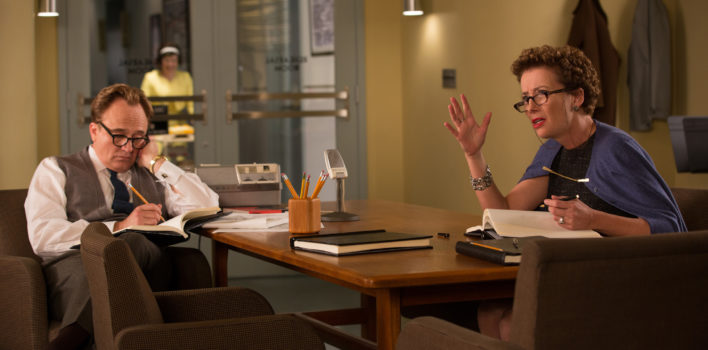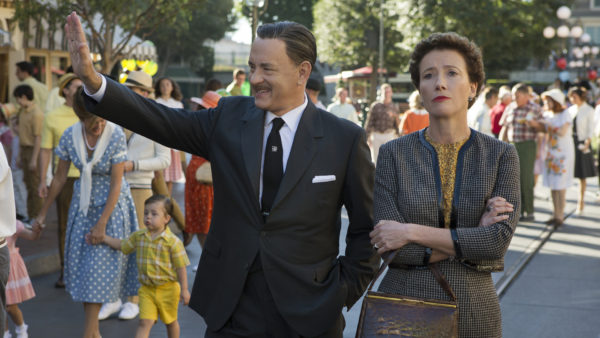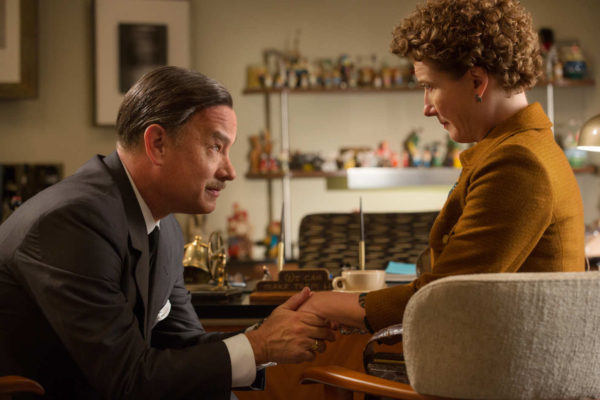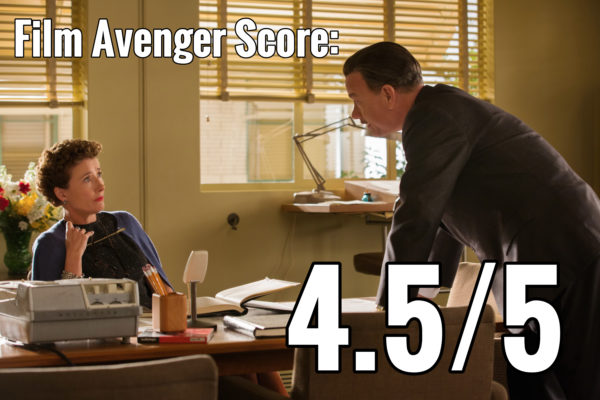Review| Saving Mr. Banks – Honor Thy Father
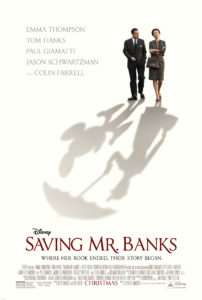 Five years ago, Disney made a film about the making of their classic film, Mary Poppins. For the first time, the company that bears Walt Disney’s name actually made a film starring their founder, and got Tom Hanks to take on the role, no less. The film was Saving Mr. Banks, and it has a lot of Disney-style charm and a heaping helping of heart. With Mary Poppins Returns on its way, it seemed appropriate to revisit the original film as well as this one.
Five years ago, Disney made a film about the making of their classic film, Mary Poppins. For the first time, the company that bears Walt Disney’s name actually made a film starring their founder, and got Tom Hanks to take on the role, no less. The film was Saving Mr. Banks, and it has a lot of Disney-style charm and a heaping helping of heart. With Mary Poppins Returns on its way, it seemed appropriate to revisit the original film as well as this one.
When it was released in theaters back in 2013, I had to see Saving Mr. Banks twice to fully appreciate it. The first viewing was peppered with my grumblings about the historical accuracy of the events depicted. But the second time made me see the film for what it was: an enjoyable piece of cinema truly inspired by actual events.
Saving Mr. Banks is not a documentary, nor does it claim to be. It is a film, and a wonderful one at that. Much like the film Hitchcock placed the Master of Suspense in a fictionalized account of an actual event, in Hitch’s trademark style, Mr. Banks places Walt Disney, the man, in one of his “Disney” films – a very clever tribute.
Saving Mr. Banks was a story about legacy – how crucial a parent’s behavior is in shaping their children’s outlook on life. It was a movie about a desperate plea for a parent’s redemption, a plea that mirrors our own yearning for redemption, which can only be satisfied by Jesus Christ.
SPOILERS AHEAD
The Good: Travers’ Transformation

The standout performance in Saving Mr. Banks was Emma Thompson as Mary Poppins author P.L. Travers. She disappeared into the role and imbued the film’s Travers with as much tenacity and stubbornness as the real McCoy. Yet, she was able to drop hints of her softer side. Her verbal showdowns with Tom Hanks’ Walt Disney were among the many highlights of the film. It was a shame that she wasn’t even nominated for an Oscar.
John Lee Hancock was the perfect director for this film. His films are warm, inspiring, somewhat nostalgic, filled with an indescribable sense of wonder– and this one is no exception. The color palette is bright and cheerful, and the flashback scenes to Mrs. Travers’ childhood (though dark in nature) have a hint of sepia tones. Most Hollywood films today are dark, even the supposed “feel-good” ones. In today’s cynical culture, it’s always refreshing to see a movie that just makes one genuinely feel good after seeing it.
Thomas Newman delivered another wonderful score. Newman is good at striking emotional chords (pun intended)– not many melodic tunes one could hum, but simpler musical “feelings.” He also uses eclectic orchestrations, but not to the point of being pretentious or distracting.
The Bad: The Walt Factor
Try as he did, Tom Hanks was no Walt Disney, and his performance consistently reminded me of that fact. I never bought it. I must, however, give him credit for doing his homework and researching the role. He picked up all of Walt’s unique mannerisms, but he was still Tom Hanks with a mustache.
To say that this film was inspired by true events would be entirely accurate. It did play fast-and-loose with the facts. I understand that certain liberties sometimes have to be made to turn real events into films, some of the leaps taken in Saving Mr. Banks were peculiar, and some were downright unnecessary.
Just as an example, Ralph the limousine driver (played wonderfully by Paul Giamatti) was made up, even though there was a real person in charge of handling Mrs. Travers during her time in America: a Disney Studio storyman named Bill Dover. I could understand giving Walt more to do by taking Mrs. Travers around Disneyland (Bill actually toured Mrs. Travers through the park; Walt was actually in Palm Springs for most of the time she was working with the story team at the studio), but Bill could have still been that emotional linchpin that Mrs. Travers needed to change her mind, and it would have been more historically accurate.
Redeeming Father
The film’s core comes from Mrs. Travers’ inability to let go of Mary Poppins, fearing Walt Disney’s “Disneyfication” of the stories. This reluctance was revealed to be about more than protecting her creation. She must let go of certain memories from her past she has harbored – memories that inspired characters in the books. The titular Mr. Banks, the aloof patriarch of the family Mary Poppins comes into, was based on Mrs. Travers’ response to her late father’s erratic behavior.
One of the Ten Commandments is to “honor your mother and father,” (Exodus 20:12), and for many people, it is one of the most difficult to keep. Since our parents are just as imperfect as we are, mistakes are made, and resentments can build. Most parenting mistakes are small, but others are deeply scarring. Parents sometimes have little idea that the things they do have a lasting impact on their children – even seemingly small things. In spite of it all, we are expected to honor our parents for their role in our lives. They, after all, sacrificed much to bring us up. Most do the best job they can and deserve respect from their children.
Mrs. Travers had a very conflicted view of her father. She saw him as a happy and playful man and respected him so much that she took his first name as the last name of her pen name (she was born Helen Goff). Yet at the same time, she saw him as a weak, immature lout saddled with a debilitating drinking habit, who never really concerned himself with actual work.
Mrs. Travers resented her father and was unwilling to forgive him for the pain he had caused her family, but she was also unwilling to forgive herself for what she believed was encouraging her father’s addiction. She bristled at Walt and his crew’s efforts because she perceived them to be propagating her father’s silly, saccharine philosophy. And still, Pamela had an innate desire to “save” her father, or at least his memory, from being tarnished by the sins of the past. Any attempt by the production team to make George Banks look bad was met with genuine, pent-up hostility.
The emotional breakthrough finally came when Walt sat Mrs. Travers down and, after understanding her reasons, explained that her father can, indeed, be redeemed– by saving George Banks. Walt reassured her that George Banks’ redemption, and therefore her father’s, would be seen and felt by everyone who saw the finished film. She just needed to have faith that Walt would come through on his promise.
“In every movie house, all over the world, in the eyes and the hearts of my kids, and other kids and their mothers and fathers for generations to come, George Banks will be honored. George Banks will be redeemed. George Banks and all he stands for will be saved. Maybe not in life, but in imagination. Because that’s what we storytellers do. We restore order with imagination. We instill hope again and again and again.”
Redemption is one of the key themes of a good story. It is something we gravitate toward because, deep in our hearts, we know that we are in need of, and hope for, redemption. However, it is not up to us or our children to redeem our name.
This righteousness is given through faith in Jesus Christ to all who believe. There is no difference between Jew and Gentile, for all have sinned and fall short of the glory of God, and all are justified freely by His grace through the redemption that came by Christ Jesus.
-Romans 3:21-24
Rather than restoring order with words or deeds, God came to earth and died to restore our place with Him. God’s restoration of hope came from His sacrifice. There was nothing we, as imperfect sinners, could have done to attain our own redemption. We and our parents—everyone—can be redeemed by God’s sacrifice. As Christians, we have a hope instilled in us that our transgressions will be forgiven and, one day, we will be able to step into the presence of our Lord.
Walt implored Mrs. Travers to let go of a life dictated by past hurts, and live life the way it should be lived. Sin can cause us a hard and painful life, living with the knowledge of past hurts and transgressions, with no hope of redemption. Forgiveness through Jesus Christ is the way to end the cycle of resentment and hurt and begin a path to true, real forgiveness and true life.
The Last Word
Saving Mr. Banks is a great movie. While it does not follow the historical events on which it is based to a T, it flows with the spirit of the true story. It is a deep story that makes us think about the legacy of our parents, and question what kind of legacy we will leave behind. The narrative contains an uplifting message of redemption that parallels our story of redemption with our Lord and Savior.
In this more cynical age, there will be those who will scoff at this film’s sweetness, which is really quite sad. I think that (to paraphrase Agent Coulson from The Avengers) with what’s going on in the world today, people could use a little more sweetness.
You may also be interested in listening to episode 13 of the Reel World Theology podcast, all about Saving Mr. Banks.


